Many tend to believe that marketing information strategies are losing their potency.
We’re here to give you a different perspective. With concerted effort and dedication to producing high-quality informational content, tactics like webinars and white papers can still contribute beneficially to your brand’s lead generation strategy.
In this blog post, we will explore how these traditional marketing tools still have a place in your marketing strategy.
Understanding White Papers and Webinars
White papers and webinars have been instrumental in the field of marketing, serving as powerful tools to convey in-depth knowledge, share industry trends, and exhibit expertise.
Their significance lies in the opportunity they provide to engage with audiences on a deeper level. When used effectively, these mediums have consistently demonstrated their ability to generate valuable leads and conversions for businesses.
Industry white papers and webinars both fall under the category of marketing information predominantly intended to educate a brand’s audience about a complex idea. They are often used to support a marketing strategy and are typically shared freely with anybody who wants to learn about the subject matter in which they cover.
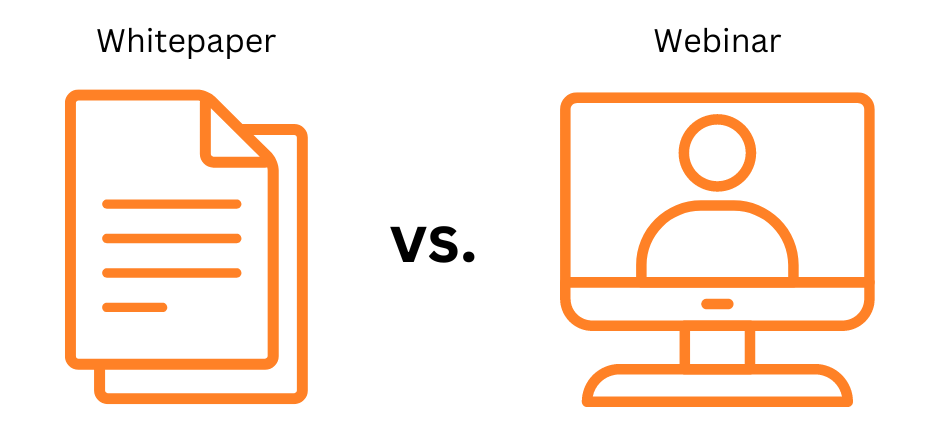
Let’s start off by briefly defining what white papers and webinars are:
- White Paper: A white paper is a comprehensive industry document designed to provide a deep understanding of a specific topic. Unlike regular articles or blog posts, white papers offer in-depth analysis, insights, and recommendations based on thorough research and expertise. They are often used by businesses to establish thought leadership, showcase industry knowledge, and present solutions to complex problems.
- Webinar: In contrast to white papers, webinars offer a more interactive and dynamic experience for both presenters and attendees. A webinar is a live or pre-recorded online presentation that enables businesses to connect with their audience in real time. It provides a platform for delivering valuable information, sharing expertise, and engaging with participants through interactive features such as polls, Q&A sessions, and chat functions.
White Papers
White papers are typically longer than other forms of content, ranging from a few pages to several dozen pages. They are typically structured with a detailed analysis of the topic, supported by data, statistics, case studies, and expert opinions.
Because they can be quite long and detailed, it’s nice to provide a welcome and a table of contents, as Search Engine Journal‘s “Guide To SEO” white paper does:
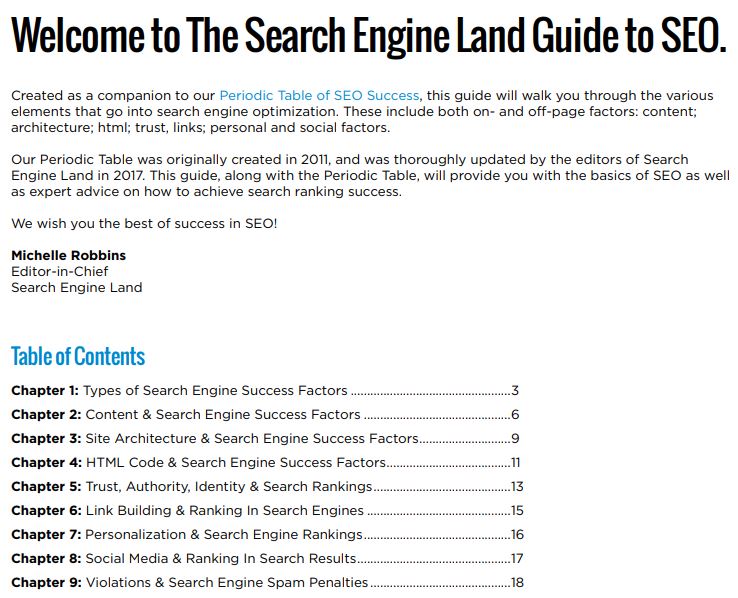
One of the main objectives of a white paper is to educate and inform the target audience. They are commonly used in industries such as technology, finance, healthcare, and professional services, where complex concepts and solutions require detailed explanations.
They help build credibility and trust among potential customers, as well as establish a foundation for thought leadership within the industry.
Furthermore, white papers can be used as lead-generation tools by gating the content, requiring interested readers to provide their contact information before accessing the document.
Dive Deeper: How to Boost Lead Generation and Authority with White Papers
Webinars
Webinars are typically conducted using webinar software or video conferencing platforms, like WebinarJam or GoToWebinar:
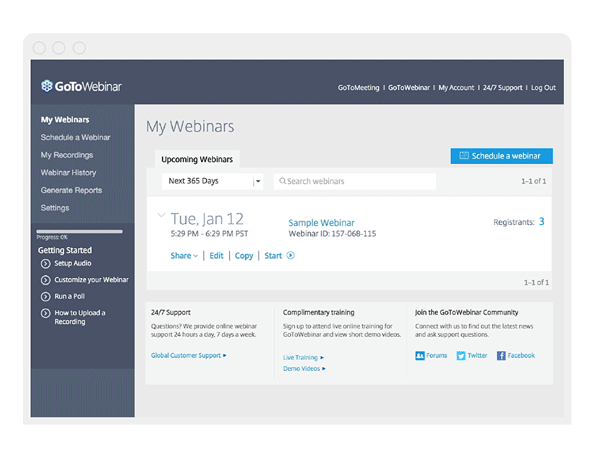
Webinars can range in duration from a short 15-minute session to an hour-long presentation, depending on the topic and engagement level desired. Webinars allow presenters to deliver content using various formats, including slideshows, live demonstrations, video clips, and screen sharing.
One of the primary advantages of webinars is the ability to create an interactive and engaging experience for participants. Attendees can ask questions, provide feedback, and interact with the presenter and other participants in real time.

This level of engagement fosters a sense of community and encourages active participation, enhancing the overall learning experience.
Webinars are particularly effective for conveying complex or technical information, as they provide an opportunity for clarification and immediate feedback. They are widely used for training sessions, product demonstrations, industry updates, and thought leadership presentations.
Webinars also offer the benefit of convenience, as participants can join from anywhere with an internet connection, eliminating the need for travel or physical attendance.
Dive Deeper: How to Build a Strong Personal Brand Using Webinars
Do White Papers Still Matter?
When it comes to any form of content, whether it be written material or webinars, its potential for success lies in its ability to be outstanding and captivating. If a piece of content is truly amazing, if it is well-crafted and manages to stand out from the rest, it is likely to be effective.
To illustrate this, let’s take the example of reading an investment letter from the investment firm Elliot Partners. These letters are typically quite lengthy and packed with information, making them dense reads.
However, when notable investors like Howard Marks (from Oak Tree Capital), Warren Buffet, or Jeff Bezos share their insights through such letters, they hold tremendous value and attract attention. Their reputation and expertise make readers eager to consume the entire content (and sometimes even pay to read it).
In such cases, a truly exceptional and thoroughly thought out piece of white paper content can still move the needle when it comes to driving traffic through your sales funnel:
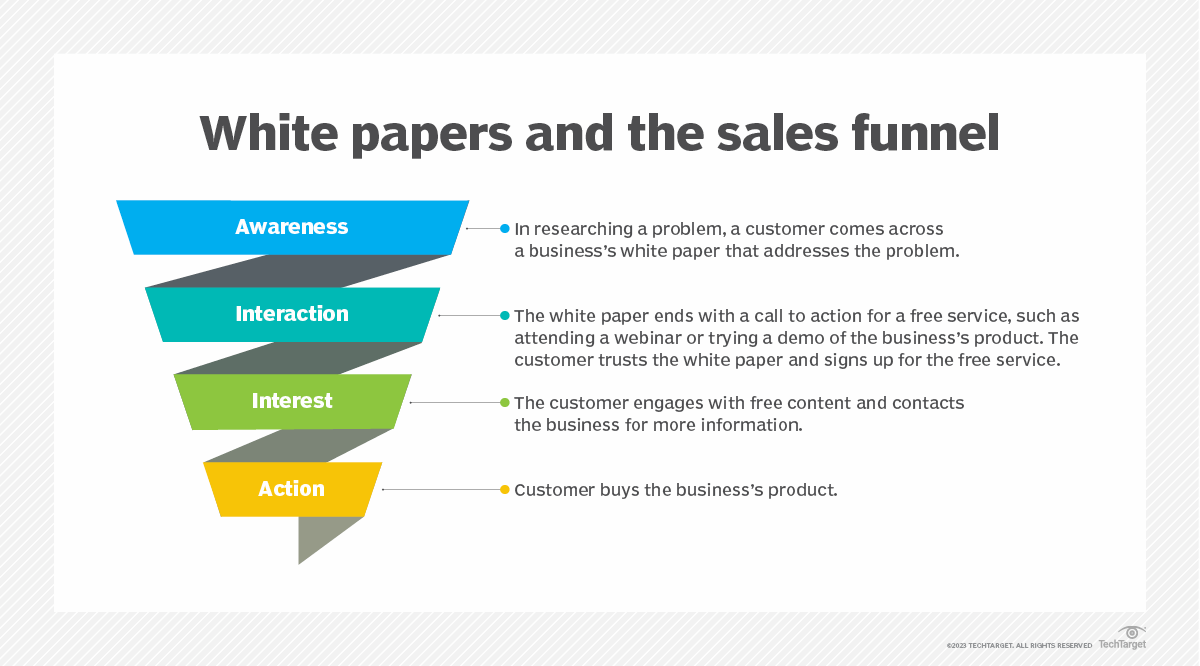
Ultimately, the key to success in any form of content lies in creating something that stands out from the ordinary and offers valuable and insightful information that keeps them engaged.
The Shift Toward Webinars
While white papers still have their place, webinars have gained prominence in recent years.
Webinar engagement results have consistently been better compared to other forms of content.
In fact, 76% of marketers say webinars allow them to drive more leads:
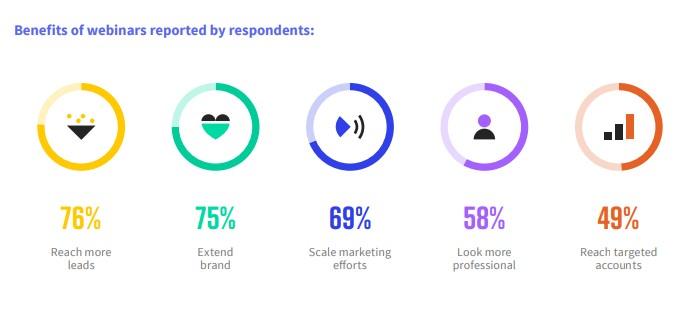
The key, however, is specificity and usefulness.
If you were to conduct a webinar focusing on the future of SEO in 2023, you may receive a significant number of leads, but it is rare for most of those leads to convert into actual customers. However, if you delve into the topic of scaling up Facebook Ads for e-commerce sites, taking into account the recent iOS privacy changes, the results are markedly different.
By narrowing your focus to a specific platform (Facebook) and industry (e-commerce), you may generate fewer leads, but the conversion rate from leads to customers becomes significantly higher. As a consequence, the revenue generated from these specific webinars, tailored to a particular industry or tactic, proves to be substantial.
Remember to be laser-focused and targeted in your webinar content, addressing the needs and challenges of a particular industry or tactic. Again, this approach may result in a smaller pool of leads initially, but the quality of those leads and the subsequent conversion into paying customers will likely be significantly higher.
The Importance of Specificity
When a webinar or white paper addresses a particular industry or tactic, it demonstrates a deep understanding of the challenges faced by professionals in that field. Attendees and readers are more likely to perceive the content as credible and authoritative, making them more engaged and receptive to the insights and recommendations provided.
There are two main advantages of focused content:
- It attracts an audience that is genuinely interested in the topic at hand. This targeted approach ensures that the attendees or readers have a genuine need for the information being presented, increasing the likelihood of their active participation and engagement.
- By addressing a specific industry or tactic, webinars and white papers foster a sense of exclusivity and specialization. This positioning helps establish the content creator as an expert in the field, boosting credibility and trust among the audience.
Ultimately, the importance of specificity lies in its ability to deliver maximum value to participants and readers. Therefore, when crafting content, whether it be a webinar or a white paper, prioritizing specificity enables content creators to establish meaningful connections, drive engagement, and provide actionable insights that truly make a difference.
Dive Deeper: 8 Tips for Converting Leads into More Customers
Final Thoughts on the Value of White Papers and Webinars
White papers and webinars can be valuable marketing tools in 2023. Although their effectiveness may vary over time, the key lies in creating exceptional, honed, and engaging content.
So long as you are committed to making your white paper or webinar content as information-rich as possible, it will demonstrate to your audience that you know what you’re talking about and that you are a source worthy of their attention.
If you’re ready to level up your content with white papers and webinars, Single Grain’s content strategy experts can help!👇
Repurposed from our Marketing School podcast.



